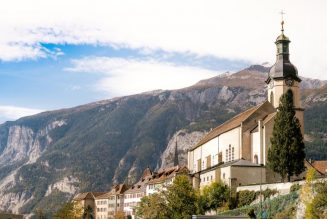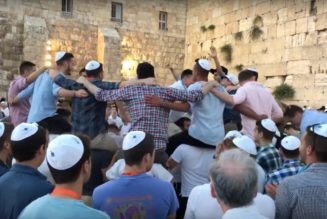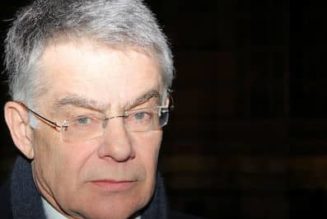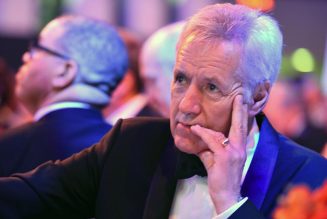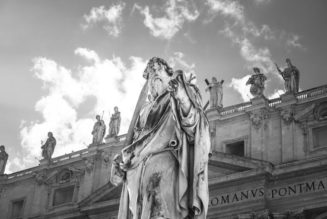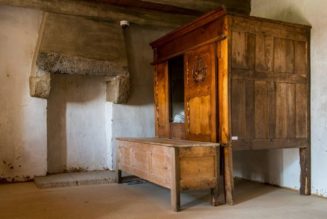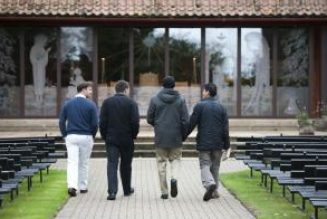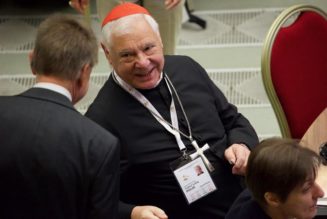If you want what Jesus, offers, you have to live where he lives — in a place of littleness and poverty, but also mystery and power. That’s the message the Church gives us on the Second Sunday of Ordinary Time, Year B, as we leave the Christmas Season, centered on Christ’s emergence into the world, and enter Ordinary Time, centered on Christ’s emergence into our lives.
This Sunday, this Ordinary season starts when John points out Jesus to the Apostles by saying: “Behold the Lamb of God!”
John doesn’t say “Behold the King of the Jews!” or “Behold the Lion of Judah!” We wish he had.
Saying both of those things would have been true. In Christmas we heard that Jesus was the newborn King of the Jews, and in the Book of Revelation, we take a trip to heaven where we learn that Jesus is the Lion of the tribe of Judah, the mighty foe of all who oppose him.
But here in Ordinary Time John points to him as the Lamb of God. That’s who God is for us, with all that phrase implies. Lambs are unassuming, easily overlooked. A Lamb of God is a sacrificial lamb, a sacrifice for the sins of the people. The original audience heard “Lamb of God,” and thought of the stand-in that they put before God; we hear “Lamb of God” and think of the stand-in that puts him before us.
But is the Lamb of God what we are looking for? A gentle presence, quiet, unassuming and small? Someone who confronts the powers of the world — and gives in to them?
It wasn’t what the Apostles were looking for; not at first. The previous day, John had already identified Jesus to them as the “Lamb of God” and he even said that this, finally, is the one he has been talking about all along — for us, ever since the early days of Advent. They weren’t interested. They didn’t follow Jesus. Maybe they had to think about it for a while.
But they finally do follow him in Sunday’s Gospel.
They tentatively begin walking behind him when Jesus stops, turns around, and locks eyes with them.
This is something that will repeat itself often in Jesus’s story. People make a slight move toward Jesus, and he shows how aware he is of them already. A woman pushes through the crowd while he’s headed to an official’s house; Zaccheaus climbs a tree to see him better; a blind man cries out by the side of the road — and Jesus spins around, looks them in the eyes and changes the trajectory of their lives.
This is what happens to the apostles. He locks eyes with them and asks, “What are you looking for?”
They answer him “‘Rabbi’ — which translated means Teacher — ‘where are you staying?”
They get it. He is not yet an acknowledged King or the Lion of Judah — but for now, they just want a teacher, but more than a teacher: a Rabbi, and more than a Rabbi — someone who they will learn from not by hearing a message, but by sharing a life. They want to train their thoughts to think like him, their feelings to feel like him, and their hearts to love like him.
That can only be done by staying with him, living at the side of the Lamb of God.
This was what Samuel learned also.
Daily Mass readings have been introducing Samuel ever since the Baptism of the Lord. He is the great priest, prophet and judge who has two books of the Old Testament named for him. We heard about his mother pleading with God before his birth, about the people pleading with Samuel for a king, and about how he reluctantly provides one — first Saul, then David.
This Sunday, we hear the story of his calling. He is sleeping in the tent where the ark of the covenant is kept — which is already called “the temple of the Lord” in the reading — when he hears his name. The priest Eli eventually tells him the voice is the Lord’s, and he should say, “Speak, for your servant is listening.”
He is like the Apostles, invited to pay attention to a God whose power so pervades the earth that it need only be expressed in a whisper.
Both the Psalm and St. Paul invite us to do the same. We prayed in the Psalm “Here I am, Lord; I come to do your will.” That echoes Samuel’s prayer in the temple of the Lord before the Temple of the Lord was built. St. Paul says we should repeat that prayer in the temple of the Lord now, after Temple of the Lord has been destroyed.
“Do you not know that your body is a temple of the Holy Spirit?” he asks. And he wants us to conduct ourselves accordingly. We are to conduct ourselves like Samuel in the Presence of God in the Ark of the Covenant and like the Apostles by the side of Jesus Christ. We are in the presence of the Holy Spirit, given to us at baptism and confirmation, who is working to configure our bodies to Christ. “Therefore glorify God in your body,” says St. Paul.
Like the Temple that Jesus cleanses in Jerusalem, the temple of our body has to be cleansed. And we have to live a pure life — not just to serve God and not just to be the “best version of ourselves,” but to “come and see” where Jesus lives and live there with him, watching how he prays, acts, and reacts so that we can believe, hope and love.
This Sunday’s Mass readings also tell us what to do this Sunday at Mass.
The priest will say, “Behold the Lamb of God,” just as John did, and we will get up and walk toward him, just like the first Apostles did.
We should ask the questions they asked, and listen for the answers they listened for. In the communion line, pray silently, “Here I am, Lord; I come to do your will.” After communion, pray “Speak, for your servant is listening.” When he asks, “What are you looking for?” give him your honest answer. And be ready for an invitation to live like he lives, think like he thinks and love like he loves.
The first thing Andrew does in the Gospel after getting to know Jesus is run to get his brother.
If we allow ourselves to listen like Samuel, and live in the Spirit like St. Paul, it will show up in our eagerness to share the experience with others, starting in our family.
Andrew shows how much he learned from staying with the Lord for a short time, calling him “the anointed one,” the Messiah, the Christ. And then Peter has the same experience of the Lord the others had: He makes a slight move toward Jesus and Jesus makes a life-changing move toward him, renaming him from Simon to Cephas; “Rock,” or Peter.
We give him a few tentative steps, and he gives us a new identity that is far greater than our previous identity. He makes it clear that he has been thinking of us for eternity. And he wants us to make clear to others that we have found the one who can at long last show us who we are.

